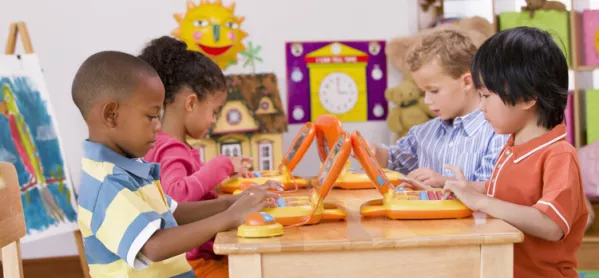- Home
- ‘The early years sector must deliver a visceral response to Ofsted’s caricatures and tropes’
‘The early years sector must deliver a visceral response to Ofsted’s caricatures and tropes’

It is a strange week when you find yourself sympathising with Ofsted.
This is exactly the position I found myself in last week when I attended a briefing designed to provide context to the highly controversial Bold Beginnings report. The briefing, held at the London Early Excellence Centre was delivered by Ofsted’s deputy director of early education, Gill Jones - and her colleague, Lee Owston. Sitting in the audience, I felt a real pang of sympathy for them both.
Bold Beginnings has been widely criticised since it was published in November 2017. Earlier this year, an open letter calling for the report to be withdrawn was signed by 1,850 early years academics, organisations and teachers.
I have spent a lot of time with inspectors over the course of my teaching career - on the back foot, working hard to justify the value of our approach. Yet I discovered there wasn’t as much satisfaction as I had imagined to be found in seeing HMI in the same position.
During the briefing, Jones and Owston spent time explaining that their research methodology was sound. They alluded to the challenges of writing the report and acknowledged their choice of language was sometimes “clunky”. Keen to point out that nothing had changed and that the document does not replace the current inspection framework, they stressed that it should not be used in “mocksteds” to critique classroom practice. The choice of photographs, they said, did not adequately reflect children’s experiences in the “good” or “outstanding” settings they visited. This, they confessed, was because of an IT glitch. There was tacit acknowledgment that, somewhere along the way, some of the messages in the report had got a bit lost.
Bold Beginnings contextualised
To summarise the new, “contextualised” message: Good schools put reading, including a strong commitment to sharing stories, at the heart of what they do. There is currently a less systematic approach to the teaching of number. Practitioners and their leaders - who understand the different contexts in which learning takes place and who are confident to offer a mix of approaches - depending on the learning and the learners, help children to achieve. Finally, to be successful you need to provide the “three Rs”: “the right thing, at the right time in the right way”.
I admire Jones and Owston for taking the time to contextualise the report. I respect them for doing it face to face with a random assortment of rightly disgruntled practitioners. Laudably, they wanted the report to explore what is happening in Reception, particularly for disadvantaged pupils taught in schools classified as good or outstanding. This is an interesting and very worthwhile area of investigation.
Why, then, do parts of the full report give me a genuine chill? Perhaps because it does represent, as the authors suggest, such a frank snapshot of teaching in Reception classes in England.
You can hear in the report two distinct narratives. One struggling to get out - now being partially liberated by HMI - that speaks about the uniqueness of Reception, a passion for storytelling, the importance of spoken language, resilience and perseverance, the need to deepen children’s understanding of core concepts and a desire to get it right to set the context for lifelong learning. However, the louder narrative is one that is littered with cliché. Forgive my “clunky” language, but it includes characterisation of outdoor play as “exercise” and “letting off steam”, attendance at school assemblies as a benchmark of successful integration into the “life of the school” and exercise books, sitting at tables and banishing whiteboard pens as signifying good learning.
‘This task is urgent’
I disagree with Jan Dubiel, the international director of Early Excellence who, when introducing the briefing, argued for a measured response that doesn’t polarise the debate. Instead, I call for a very visceral response that makes sure the caricatures and tropes contained in the report do not become a new orthodoxy in schools.
What should we do with Bold Beginnings? One colleague at the briefing wisely asked how we, as an early years community, might support Ofsted in sharing the contextualised message more widely? This task is urgent. Reception teachers across the country are returning to their classrooms after the half term break to teach, to be observed and to be inspected.
Next, we need to explore the new “three Rs” mantra, to pull it apart, to debate. What are the right things? When are the right times? What are the right ways? Finally, we need to use this opportunity, to state clearly that this report presents us with one view. Admittedly, it is a powerful, influential view placed in the public domain by an organisation that currently holds great sway in the English school system, but it is still one view, amongst many. Recognising it as such might prove to be the boldest beginning of all.
Elizabeth Havard is an assistant headteacher in an inner London primary school and a former LEA advisor
Want to keep up with the latest education news and opinion? Follow Tes on Twitter and like Tes on Facebook
Keep reading for just £1 per month
You've reached your limit of free articles this month. Subscribe for £1 per month for three months and get:
- Unlimited access to all Tes magazine content
- Exclusive subscriber-only stories
- Award-winning email newsletters
